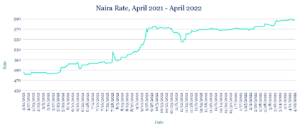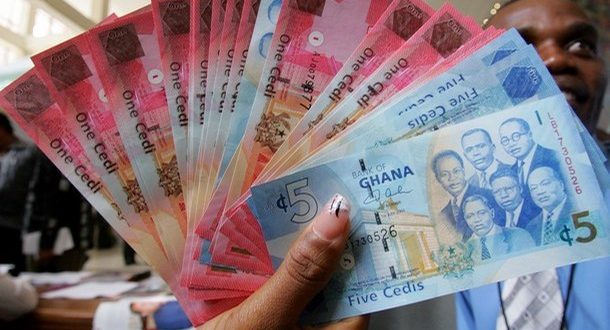African nations’ debt distress risk jumps
The economic fallout from Russia’s war in Ukraine is causing a sharp deterioration in debt sustainability for many African nations. The proportion of African countries at high risk of debt distress rose to 60.5% from 52.6% in October, the World Bank said in the April edition of its Africa’s Pulse report, heightening the need for improved relief measures to help avert a potential wave of debt crises on the continent.
Meanwhile, food prices could be driven even higher and pile further inflationary pain on consumers in grain importing African countries as vessels unable to leave Ukrainian waters reduces availability and will likely push shipping rates higher, according to the head of the International Chamber of Shipping. One positive note this week: Italy has joined the growing list of EU countries turning to Africa in search of alternative gas supplies, including in Angola and the Congo Republic.
Naira holds record low despite growth boost
The Naira remained at a record low against the dollar this week, trading at 589. Nigeria’s inflation rate increased for a second month, edging up to 15.9% in March from 15.7% in February amid soaring food and energy prices.

The cost of diesel—which is not controlled by the government—has more than doubled over the past month as a result of Russia’s war in Ukraine.
Despite those inflationary pressures, the World Bank improved its outlook for Nigeria’s economic growth in 2022 by 1.2 percentage points to 3.8%, driven by higher commodity prices, a good performance in the non-oil sector and relaxation of stringent pandemic measures.
We expect the Naira to hold firm against the dollar at its 589 resistance level.
Inflation and debt to weigh on Cedi
The Cedi appreciated marginally against the dollar this week, trading at 7.60 from 7.63 at last week’s close.
Ghana’s central bank said it plans to issue GHS24bn of local bonds in the second quarter of this year, GHS20bn of which will be used to rollover existing debt and the remainder will be used for government financing needs.

Ghana’s cocoa board also this week warned that cocoa output could drop by 31% this year amid a prolonged drought that has stunted the growth of cocoa pods. We expect the Cedi to weaken against the dollar in the coming days due to sustained inflation and pressure on its foreign debt.
Rand weakens as inflation adds to domestic woes
The Rand weakened against the dollar this week, sliding to 15.5 from 14.65 at last week’s close.
Prolonged heavy rains in Durban and the KwaZulu-Natal province have caused extensive flooding and mudslides, claiming the lives of at least 440 people and causing more than ZAR10bn in damage.

South Africa’s energy company Eskom this week announced an increase in its load shedding programme, with many parts of the country subjected to multiple daily power cuts. Meanwhile, inflation climbed to 5.9% in March from 5.7% in February, testing the upper limit of the central bank’s target range of 3% to 6%.
Against that backdrop, and with a stronger dollar, we expect the Rand to remain under pressure in the coming days.
Egypt seeks alternative sources of wheat and tourists
The Pound appreciated slightly against the dollar this week, trading at 18.47 from 18.5 at last week’s close.
Egypt this week approved India as one of its key wheat suppliers as it seeks to diversify import sources amid supply disruptions from Russia and Ukraine.
That followed extensive field visits and quality checks in response to complaints about defective Indian wheat exports.
Meantime, Egyptian authorities are targeting increased tourism from Latin America and Asia to make up for reduced visitor numbers from Russia and Ukraine, who accounted for about 40% of arrivals prior to the start of the conflict. Recovery in tourism should help the Pound to appreciate in the longer term.
Kenyan Shilling at fresh record low on energy imports
The Shilling slumped to a new record low against the dollar this week, depreciating to 115.65/116.25 from 115.4 at last week’s close amid increased demand for the greenback from the oil and energy sectors.

The weakness was compounded by higher inflation due to rising food and fuel prices. Given the approaching general election in August, we expect the Shilling to remain under pressure as foreign investors reduce exposure to the country to avoid any political uncertainty, exacerbating the dollar shortage.
Ugandan Shilling supported by commodity exports
The Shilling was stable against the dollar this week, trading at 3515/3525 as demand for the greenback was matched by supply, supported by inflows from remittances and commodity exports.




 Note to journalists: please feel free to quote from this briefing for news reports and let us know any requests for further comment or interviews via the contact details at the end, or by reply to this email. AZA is Africa’s largest non-bank currency broker by trading volume at over $1 billion annually. See
Note to journalists: please feel free to quote from this briefing for news reports and let us know any requests for further comment or interviews via the contact details at the end, or by reply to this email. AZA is Africa’s largest non-bank currency broker by trading volume at over $1 billion annually. See 







